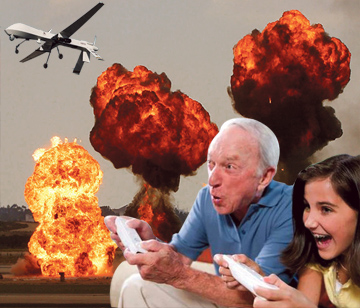Editor’s Note: This is a work of satire. The drone operator, typically a high school graduate from Marion, Ind., sits safely on the ground in a control module somewhere in Australia; he looks at a screen and flies the drone with a gaming handset similar to what he uses to play Mario Bros. Actually, it is the same handset. This allows the operator to cycle between Gears of War, which has realistic and interesting graphics, and the images transmitted from the robot plane, which lack resolution and contrast and are tedious to look at for any length of time. The operator fires missiles from the drone at suspected Afghan and Pakistani enemy targets—those objects that stand out against the landscape and bear signs of human settlement, such as barns, huts, henhouses, outhouses and any other suspicious clusters of stone and rock. He does his job without any fear of reprisal or retaliation—for Australia is a safe haven for drone operators.But the Predator drones have been malfunctioning of late. The latest drone strike conducted on a house in Shana Khuwara, Pakistan, produced only three deaths. Pentagon officials, seeking to counter the public outcry over such lackluster results, have been quick to cast blame on the building materials employed by the enemy. They freely admit that walls built of rock and stone the width of “two shinbones stacked head to head” pose formidable obstacles to even our most advanced missiles. “It doesn’t help that they are able to rebuild quickly, taking advantage of the fact that when the smoke clears, all that we’ve accomplished is turned the large rocks into smaller rocks, scattering them some—which they then exploit as new building materials,” admitted one official, who spoke on condition of anonymity. “It’s not like the rocks burn or can be destroyed—although we are looking into new drip technology that can gradually erode their structural integrity over a period of time.” I have my own theory as to why the drones have been less productive as of late. It is not the bomb-resistant building materials that are to blame, or even operator error (despite the many switches, dials and buttons that must be manipulated in Australia in order to obtain a result in Pakistan). It is not even the fault of the generals, with their ideas of a “surgical war” and their “air-conditioner in every module” rallying cry. It is the chaplains.It has been a tradition in the military to bless our soldiers before they go off to battle. We have chaplains on hand to carry out these blessings. Chaplains of all ranks, all the way up to general chaplain, are kept busy during war performing their religious duties. They bless the soldiers to protect them and keep them from harm; they bless their rifles; and they even bless, with a wave of the hand, the bullets—that they be guided swift and true.It is not uncommon for chaplains to be called upon to bless the warplanes that patrol the sky, providing air coverage for ground troops. Every aircraft carrier in the Navy has a few chaplains on hand to bless the pilots and the jets, in addition to the numerous armaments the jets carry. Because takeoffs and landings are dangerous during peacetime, and accidents and deaths occur even in time of war, there is always a chaplain on the carrier’s deck giving benedictions to the planes as they catapult off the ship. Lately, there has been a growing hesitancy among the chaplains, a reluctance, to place these same benedictions on the drones. One chaplain has offered that it is in bad taste to “invoke the hand of God in the service of a mere drone, no matter how much that drone may be worth to the American taxpayer.” This development mirrors the diminishing trend in drone performance, such as that recorded at Shana Khuwara.Another chaplain has balked at the name attached to the drone: “I never had a problem blessing the Raptor or the F-16 Fighting Falcon. I’ve also blessed plenty of Apaches, Comanches and Blackhawks—fine gunships, all of them. But the Predator? Prey Hunter, to my ear, is acceptable. Predator makes people think of Alien vs. Predator . That kind of reference is too nightmarish to be associated with a drone—something little more than a remote-controlled device armed with Hellfire missiles.” Perhaps the Predator drone is nothing more than a remote-controlled device. And perhaps the chaplains do feel ridiculous blessing this robot contraption—and making the sign of the cross over its blind, stubby nose; and perhaps they are right to feel ridiculous. But we are at war! And war is dirty, nasty business. People die in war. And in order for people to die in adequate numbers, the drones must be blessed. The implementation of robot drones is essential to our ultimate victory over the soulless hell embodied by our extremist enemies, who would wipe our kind from the Earth as by a rising storm. So, chaplains, ye men of the faith and of the cloth, stand up for God and country, in the name of besieged Christendom—and bless our drones!
Alex Escué Limkin served in Iraq from 2004 to 2005. After learning that the shuriken he carried were not false idols but a type of hurled Oriental bullet, chaplains consented to bless them per the usual custom.



